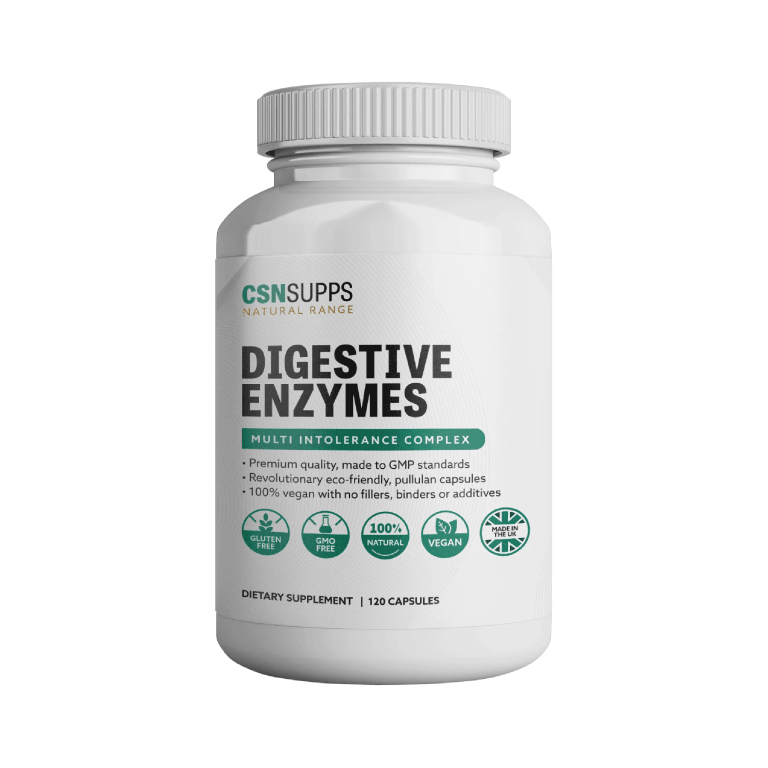Supplemental Enzymes


Enzymes used as supplements are ones that are taken orally to aid in food digestion. They are also referred to as digestive enzymes on occasion. Although the human body makes its own enzymes, there are times when it needs a little extra assistance. Supplemental enzymes can help with that. Supplemental enzymes come in a wide range of varieties, each of which is intended to help with a particular kind of digestion problem. Typical subtypes of supplemental enzymes consist of:
- Lipase: This enzyme aids in the digestion of fats.
-Protease: This enzyme aids in the degradation of proteins.
-Amylase: This enzyme aids in the breakdown of carbs.
The use of supplemental enzymes has a number of potential health advantages. For instance, they could assist with
-Improve nutrient absorption: Nutrients are not absorbed as well when food is not properly digested. Enzymes can aid in better nutrient absorption and digestion.
-Reduce inflammation: The digestive system frequently experiences inflammation. Enzymes might aid in promoting healing and reducing inflammation.
-Control your weight: Poor digestion can result in weight gain. Enzymes may aid in better digestion and weight loss.
There are numerous forms of supplemental enzymes, including capsules, tablets, powders, and liquids. They come in a variety of strengths as well. It's crucial to adhere to the instructions provided on the product label.
Others should be taken on an empty stomach. Some enzymes must be taken with food. When taking enzymes, drinking plenty of water is also important.
Most people generally consider enzymes to be safe. However, there is a chance of adverse reactions, including diarrhea, bloating, and nausea. Stop taking enzymes and consult your doctor if any of these side effects occur.
It is crucial to consult your doctor before taking supplemental enzymes if you have a chronic illness or are taking medication. Some medications can interact with enzymes.
-Lipase could react with:
Antibiotics such as erythromycin (E.E.S., E-Mycin, Erythrocin), ampicillin (Prinivil, Zestril), and others
Diuretics include hydrochlorothiazide (HCTZ, Hydrodiuril, Microzide) and furosemide (Lasix).
Protease may have interactions with:
Warfarin (Coumadin) is one example of an anticoagulant.
Aspirin and the antiplatelet medication clopidogrel (Plavix)
NSAIDs, or non-steroidal anti-inflammatory drugs, include ibuprofen (Advil, Motrin), naproxen (Aleve, Naprosyn), and others.
-Amylase might be in contact with:
Warfarin (Coumadin) is one example of an anticoagulant.
Aspirin and the antiplatelet medication clopidogrel (Plavix)
NSAIDs, or non-steroidal anti-inflammatory drugs, include ibuprofen (Advil, Motrin), naproxen (Aleve, Naprosyn), and others.
Enzymes may generally interact with:
Insulin or additional diabetes drugs
the tetracycline antibiotic (Sumycin)
Prednisone (Deltasone) and methylprednisolone (Medrol) are two examples of steroids.
certain chemotherapy medications, including methotrexate (Rheumatrex),
dietary supplements that raise stomach acid include betaine hydrochloride and
HCl.
Enzymes function by dissolving big molecules into smaller ones. The proper digestion and absorption of nutrients depend on this process. In addition to these crucial bodily functions, enzymes also play a role in inflammation and detoxification.
It is impossible for enzymes to enter the bloodstream. To digest food, they work in the digestive system.
Half-Life
The type of enzyme determines the enzyme's half-life. For instance, the half-life of lipase is approximately one hour, whereas that of protease is approximately four hours.
Digestive problems can be treated in a variety of unconventional ways. These consist of fiber supplements, probiotics, and prebiotics. Live bacteria known as probiotics are beneficial for gut health. Prebiotics are a type of fiber that aids in providing food for gut flora. Fiber supplements aid in better digestion and stool bulk.
A few lifestyle modifications, such as eating smaller meals, avoiding trigger foods, and engaging in regular exercise, can also aid in better digestion. Drinking lots of water and thoroughly chewing your food can also be beneficial.
There is no conclusive response. Both probiotics and enzymes are efficient in different ways. Enzymes aid in food digestion, while probiotics help to support gut health. Others might require the use of both probiotics and enzymes to achieve results, while some people may find that one is more effective than the other. In the end, it is up to the individual.








Plus get the inside scoop on our latest content and updates in our monthly newsletter.